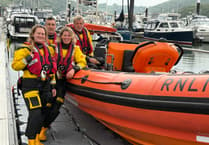TWO Dartmouth adventurers have been accepted to compete in this year’s Yukon 1000 Canoe and Kayak Race from Rotary Park in Whitehorse, Yukon, Canada.
The event, due to start on July 18, is in aid of Children’s Hospice South West.
Yorkie Lomas and Phil Langman are no strangers to experiencing gruelling and abnormal conditions to achieve outstanding success.
They were members of the Dartmouth Rowing Club who became the first four to row an ocean, setting a benchmark record of 36 days, 59 minutes and 30 seconds for the crossing from La Gomera in the Canary islands to Barbados in 2004, a record which still stands.
The also competed in the Kalahari Augrabies Extreme Marathon in 2007, a self-sufficient run over seven days, covering about 155 miles which takes place in the overbearing heat of the Kalahari Desert in the proximity of the Augrabies Falls on the Orange River.
As if that was not enough, the following year they took part in the Paris Marathon and then the London Marathon, and went on to complete eight marathons in eight days, in aid of CLIC.
Phil is the managing director of The Trail Events Company which was founded out of his love for trails and the outdoors. The company offers everybody the chance to experience UK National Parks and he has a wealth of experience setting up events from trails to marathons, mountain bike and extreme endurance activities.
The Yukon 1000 Canoe and Kayak Race is an unsupported wilderness paddling race down the Yukon River from Whitehorse, Yukon, across the US/Canada border and on to the Dalton Highway Bridge, north of Fairbanks, Alaska, a distance of about 1,000 miles.
The race goes through some of the most deserted land on the continent. Teams have to anticipate that they may spend many hours at a time out of sight of any other boat or living person and the Yukon River has very few road access points, and very few people live along its banks.
Teams must be aware that however good they are at paddling, things can and do go wrong: damaged shoulders, wrists, hands, exhaustion, hypothermia, or just getting cold and tired and teams should be equipped so they are self-sufficient for at least two weeks, preferably three.
Competitors should also be capable of immediate self-preservation and must anticipate the worst as there is no safety cover on this race.
One of the many advice notes for the race is bear precautions when they stop for the night. Between Eagle and Circle, they are required to store all food in bear canisters as approved by the Interagency Grizzly Bear Committee, or hang all food ‘at least 10ft off the ground and at least 4ft from any tree trunk. If they do not take bear canisters for their food with them in their boat, they will be required to sign a statement that they will conform to the requirements.
Yorkie and Phil are raising funds for the Children’s Hospice South West and have set a minimum target of £5,000.
Donations can be made via the link uk.virginmoneygiving.com/team/trailevents.co




